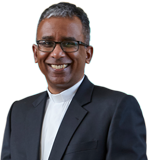The composer – and the Creator
8th November, 2019
As we prepare for the Cathedral’s upcoming concert, it always amazes me how music just seemed to pour out of some composers – their output of works is so vast !!
Mozart, of course, readily springs to mind: when he died at the age of only 35 he had written 41 symphonies, 27 piano concertos, numerous Masses, much chamber music, piano sonatas…music just seemed to so effortlessly pour out of him.
And even Vivaldi (whose ‘Magnificat’ and ‘Laudate Pueri’ we will be performing at our concert) wrote so many concertos: over (a staggering) 500 !! And let’s not forget Bach who wrote around 300 cantatas…
Interestingly, Bach included in his manuscripts of these cantatas the initials ‘SDG’ – Soli Deo Gloria (to the glory of God alone).
Here we see Bach acknowledging a connection between the composer and God – the human endeavour and the omnipotent Creator.
St John Paul II wrote about this very connection in his ‘Letter to Artists’ (1999): in a most beautiful soliloquy he mentions that ‘with loving regard, the divine Artist passes on to the human artist a spark of his own surpassing wisdom, calling him to share in his creative power’ (paragraph 1).
He goes on to further examine this creative partnership saying ‘through his artistic creativity man appears more than ever ‘in the image of God’ and then talks of the Holy Spirit as being the ‘mysterious Artist of the universe’…’the divine breath of the Creator Spirit reaches out to human genius and stirs its creative power.’ (paragraph 15).
So in their endeavours, are composers creating something that is certainly beautiful and well crafted – or something more? Is that ‘Divine breath’ which St John Paul II talks about truly ‘stirring their creative power’?
Let’s consider for a moment that all three aforementioned composers were indeed church musicians – imbued with the spirit of the liturgies they were writing for, they produced masterpieces of such profundity and genius that even after several centuries they captivate us and truly transport us into another realm – certainly examples of the Holy Spirit’s divine breath stirring the human imagination.
So let’s offer a prayer for the composers of our own time…that they be prolific in creating works not just of superficial beauty but, as St John Paul II mentions in the closing words of his Letter: ‘May your art help to affirm that true beauty which, as a glimmer of the Spirit of God, will transfigure matter, opening the human soul to the sense of the eternal’ (paragraph 16).
Candlelight Classics
Sunday 17th November
7:15pm
Tickets at ticketswa.com

